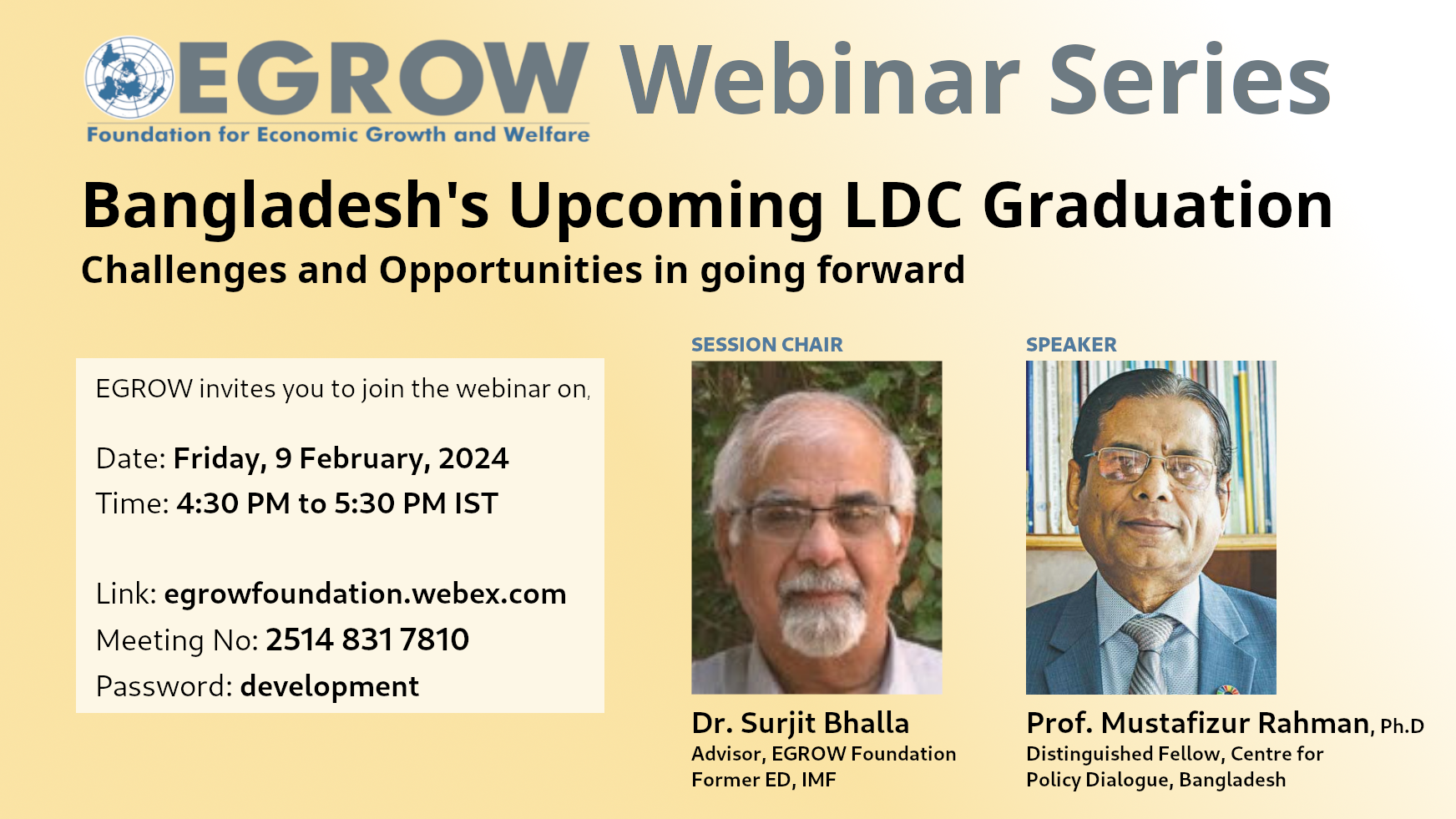Bangladesh's Upcoming LDC Graduation: Challenges and Opportunities in going forward

Webinar Link
Meeting No: 2514 831 7810
Password: development
Certificate of Participants
To recieve certificates, please register and attend
Abstract
Bangladesh will graduate from the Least Developed Country (LDC) group in 2026, a watershed moment for a young country. However, this brings with it many benefits and challenges. On the one hand, it will enhance the confidence of the country in dealing with the international financial bodies, improve its credit rating and attract higher foreign direct investment flow, on the other hand, graduation will affect certain preferential treatments in trade, subsidy to agriculture and infant industries and access to some LDC-specific funds. Bangladesh has recently been endorsed by the United Nations (UN) Committee for Development Policy (CDP) to graduate from the Least Developed Country (LDC) group in 2026. After five decades, a milestone has finally achieved Bangladesh’s development journey. This is indeed a watershed moment for this relatively young country. Bangladesh has reached this point by making impressive progress in the areas of socio-economic development. The speaker will deliberate about the growth and development of Bangladesh.
About the Speakers
Dr. Surjit Bhalla
Dr. S.S. Bhalla, is a Senior India Analyst for the Observatory Group, a New York based macroeconomic policy advisory firm and Chairman of Oxus Research & Investments. In 2017, he was appointed as Member of the Prime Minister’s Economic Advisory Council. He has been a member of the Secondary Markets Advisory Committee of SEBI and the National Statistical Commission of India. Dr Bhalla writes extensively on economic issues and has recently authored another book titled, The New Wealth of Nations.
Prof. Mustafizur Rahman
Professor Mustafizur Rahman is currently serving as Distinguished Fellow at the Centre for Policy Dialogue (CPD), a leading think tank in South Asia. He is also a member of Board of Trustees of the CPD. Earlier he served as Executive Director of CPD (2007-2017). Professor Rahman taught for twenty-five years at the University of Dhaka before taking voluntary early retirement to work full time at CPD. He was awarded the prestigious Ibrahim Memorial Gold Medal by the University of Dhaka for excellence in research. Professor Rahman served as a member of the Dhaka University Senate (2009-2013, 2017-2021 and 2021-present). He is a member of Board of Trustees and Syndicate of the BRAC University.
In recent times Professor Rahman has carried out a number of research works in the areas of public policy analysis, macroeconomic management, and macro-fiscal-monetary performance of Bangladesh economy. Some of his very recent works have focused on implications of the Covid pandemic on the Bangladesh economy, and Bangladesh’s strategies in view of LDC graduation. As part of academic and research careers Dr. Rahman has worked on a diverse range of issues including trade policies and trade reforms, globalisation, regionalisation and regional trading arrangements, connectivity in the Southern Asian region, WTO, multilateral trading system and interests of low income countries, and implementation challenges of the Sustainable Development Goals (SDGs) in Bangladesh. Professor Rahman has published widely in professional journals both in Bangladesh and abroad, and has authored books and monographs in areas of interest and expertise. He is a Series Editor of South Asia Economic Policy Studies published by Springer and Member of Editorial Board of the Rising Powers and Global Governance (RPGG).
At different points in time Professor Rahman has served as member of a number of important national bodies and committees set up by the Government of Bangladesh. These include WTO Advisory Committee, National Coal Policy Review Committee, Regulatory Reforms Commission, Committee to review National Sustainable Development Strategy, National Task Force to Monitor the Impact of Global Financial Crisis, Consultative Group of the Economic Relations Division (ERD), Core- committee on Transit and Connectivity and Study Team for BCIM-Economic Corridor. Dr. Rahman was a member of Advisory Committee of National Human Development Report. He has served as a member of the T-20 for G-20 Task Force set up to provide policy advise in view of the Japanese Presidency of the G-20 2019. He is a member of the Core Group of the Citizen’s Platform for SDGS, Bangladesh. Dr Rahman served as member of the Panel of Economists for Bangladesh’s Sixth and Seventh Five Year Plans, and was a member of the Panel of Experts for the First and Second Perspective Plans of Bangladesh (2011-2021, and Vision 2041).